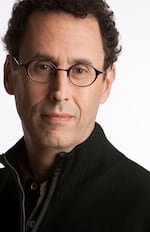
Playwright Tony Kushner.
Joan Marcus Hires / Courtesy of Tony Kushner
Playwright Tony Kushner is a fearless explorer of spaces where the personal meets the political. His two-part Pulitzer Prize-winning masterpiece, “Angels in America: A Gay Fantasia on National Themes,” kicked down the door to a discussion of the AIDS epidemic. Kushner has also grappled with the human costs of the Civil War and World War II, in screenplays for Steven Spielberg’s films “Lincoln” and “Munich”, always keeping humanity in sharp focus.
Who better to steer us through a conversation about the political and social upheaval of the past year? Next week, Kushner comes to Oregon to deliver the keynote speech at the Oregon Arts Summit. Here are some highlights from our conversation:
On comparing the state of the U.S. when he wrote "Angels in America" with the current state of political and social upheaval:
"It's difficult to talk right now about where the country is. I think the country is, in a certain sense, in one place, in reality, and then launched into kind of a nightmarish state. I think it's thrown us into a kind of unprecedented warped state of self-knowledge. When I started working as a playwright, it was during the early years of the Reagan administration. The great difference was there was a feeling we had, by 1980, arrived at a point of successful, widespread conservative counter-revolution to the social and cultural revolution of the '60s, that Reagan was the front-man for, with a tremendous amount of popular support. That isn't true of Trump."
On how people place their own experience in the context of larger national events:
"I think when people are in moments of crisis they tend to be more aware of a possible connection between events in their lives and events in the world surrounding them. When everyone is going through the same kind of crisis moment, that makes a connection between the personal and the political electrified in a certain way. And I feel that people tend to walk around wondering about that connection. Some people do it more coherently than others. Some people do it with with more imagination and daring than others. Some do it more productively than others. But I think we all have a tendency to read tea leaves and wonder about metaphor. The fun thing about working in the arts for me is finding ways to make the two spheres, personal and political, reflect each other."
On the play he's attempting to write about Donald Trump:
"It's very early. I think the problem with him as a character — to be a really interesting character in a play, there has to be a degree of behaving in a way that rewards contemplation that's required. If a person's contradictions are organized around a coherent core, whether the person is a good person or bad person, whether you agree with that person or not, there's a value in reading that behavior. You'll find certain truths about human behavior reflected back at you. When a person is so damaged that there's not any kind of coherent and solid core, it's not really a character study."
On a screenplay adaptation he wrote based on David Kertzer's book, "The Kidnapping of Edgardo Mortara," in line for production by director Steven Spielberg:
"I brought it to Steven, not to make a movie — I just wanted him to read the book. I loved it very, very much. I bought it when it first came out, sat down one morning to read the first chapter, and got up eight hours later. It takes place in 1858 in Bologna, Italy, when over a third of the peninsula is governed by the Pope. And the papal police take a 6-year-old Jewish boy from his parents. He's been secretly baptized by a well-meaning young girl who's working for the family. So the Vatican decides he has to be removed from his parents' home. They've done this many times before over the centuries. They really misunderstood the nature of the times. It was the beginning of the Risorgimento, the movement to unite Italy under a secular parliamentary monarchy. The world was going through a democratic revolution."
On another Spielberg collaboration in the works: a remake of "West Side Story":
"I've just finished the second draft. Steven seems to like it. I'm very excited about it. Steven is finishing a film right now called 'The Post' — with Meryl Streep and Tom Hanks about the relationship between [former Washington Post executive editor] Ben Bradley and [the Washington Post's former publisher] Katherine Graham. When he's done with that, he's also got a big science-fiction movie called 'Player One' coming out. At some point, we'll do 'Edgardo,' and hopefully then we'll do 'West Side Story.'
